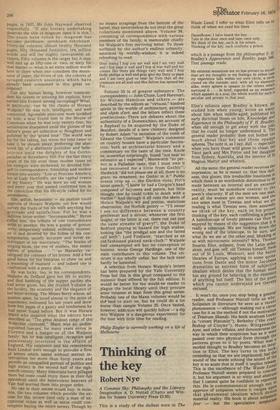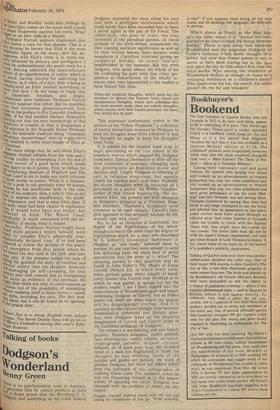Thinking of the key
Robert Nye
A Common Sky: Philosophy and the Literary Imagination A. D. Nuttall (Chatto and Windus for Sussex University Press £3.95) This is a study of the dullest note in The Waste Land. I refer to what Eliot tells us to think of when we read his lines Dayadhvam: I have heard the key
Turn in the door once and turn once only We think of the key, each in his prison Thinking of the key, each confirms a prison
which is a passage from the philosopher F. H. Bradley's Appearance and Reality, page 346. That passage reads: My external sensations are no less private to myself than are my thoughts or my feelings. In either case my experience falls within my own circle, a circle closed on the outside; and, with all its elements alike, every sphere is opaque to the others which surround it . . . In brief, regarded as an existence which appears in a soul, the whole world for each is peculiar and private to that soul.
Eliot's reliance upon Bradley is known. He studied him when young; wrote an essaY about him when middle-aged; published his early doctrinal thesis on him, Knowledge and Experience in the Philosophy of F. H. Bradley, when old enough to get away with the joke that he could no longer understand it. The general reader probably does not bother too much about that key and those opaque spheres. The note is, as I say, dull — especially when you have those wild geese to chase, the Tarot pack and Mrs Porter and her daughter from Sydney, Australia, and the interior of St Magnus Martyr and whatnot.
All the same, the general reader receives the impression, as he is meant to, that this dull' ness, this gloom, this irreducible loneliness In which there is no worthwhile distinction to be made between an internal and an external reality, must be somehow central to the poem's obscurity. If all the men are one mall' and all the women are one woman, and the two sexes meet in Tiresias, and what we are reading is what Tiresias sees, then assuredlY we think of the key, each in his prison thinking of the key, each confirming a prison. A kaleidoscope of lovely phrases can thus he enjoyed by means of the suggestion that It Is really a telescope. We are looking down the wrong end of the telescope, to be sure, an", what do we see at the other end, blinking a' us with microcosmic intensity? Why, Thornas Stearns Eliot, solipsist, from the Latin so/us, alone, and ipse, self, old Tiresias himself, fresh out of St Louis, Missouri, and the better libraries of Europe, applying to some cltotations from Dante and the minor Jacobean dramatists an extreme form of subject idealism which denies that the human rnmu has any ground for believing in the existence of anything but itself. The bits of the pnerfl which you cannot understand are therebY excused.
. It won't do, once you stop being a general reader, and Professor Nuttall tells us NOY Solipsism in literature he sees as a recent phenomenon — although making out a clev. er case for it as the method if not the motivation of Tristram Shandy. His book analyses Locke (a "covert Platonist"), Berkeley ("the crazY Bishop of Cloyne"), Hume, Wittgenstein, Ayer, and other villains, and demonstrates th: way in which their scepticism has as it were passed over into physical form through tha patterns given to it by poets. What was morbid thought to Bradley becomes an 1nt9,1 tion in Eliot. The key turns in the locl‘e' reminding us that we are imprisoned, but tile sound of the words echoing the sound of, key is so acute that in itself it implies releasT This is the excellence of The Waste Larif Professor Nuttall seems prepared to conceL% it, but his argument is so witty and abstrusv that I cannot quite be confident in reportinttg, this. He is commonsensical enough not approve of solipsism where it verges tic material that phenomenal idealism which denlIle:c material reality. His book is about solipsla._, fear — but the speculative scepticisn' • Hume and Bradley turns into feelings by time Eliot comes on the scene with a need 'Kt! shore fragments against his ruins. What 4",„gan as an idea ends as a disease.
rrofessor Nuttall appears displeased that diot found a cure for that disease. This is a PitY because he knows that Eliot is the most 1111Purtant figure in his story, and his engagement with Eliot's verse is in many restPkects informed by delicacy and intelligence. I nk he underestimates the poet's need for a llask. Having admitted the unsatisfactory nature of an apprehension of reality which is 11 mind, having elected for admitting the ,cxistence, as it were, of a face, then a being as trIplicated as Eliot needed something to ''h9ver that face. I do not mean to imply that (.1s classicism, royalism, and Anglol'atholicism were insincere. Professor Nuttall not suppose that either. But he stumbles 'ver that notorious pronouncement, first fIllade in the preface to For Lancelot Andrewes L19:28). If he had recalled Herbert Howarth's nting out that the very terminology of this r,anifesto is evasive in that it plagiarises a 3• editorial in the Nouvelle Revue Francais "uout the desirable tradition being "classique, Zthnlique, monarchique" then he might have , en enabled to write more kindly of Eliot as °Christian. snT„w0 more things may be said about Eliot's „.",'113sism: Nuttall refrains from the task and I risk crudity by attempting it at the end of :brief review of a good book which needs space to do it justice. First, to define the r-rnutilating idealism of Prufrock and The • ste Land is not to make any valid criticism ,Pb,r these works as poems. When it is impossihle for a poet to say precisely what he means, 7ause he has insufficient faith in the existelri_ee of his auditors, then it falls lo him to say ti7t, to express the insufficiency, the doubt, h.e impotence, and that is what Eliot does. If t:Is early verse had been clearer in expression d.ert it would have been not better, but Ifferent in kind. The Waste Land, splioecifically, is much concerned with the im ssibility of saying what it means. econdly, Professor Nuttall might have v;',Lind more patience within himself, with e tlich to consider Eliot's admittedly overhnljhatically declared 'cure,' if he had been "o'ePared to follow the process of the poet's hemergence from that prison where he 04c1 heard the key turn in the lock, and turn. Ze only. If the prisoner makes the step of Ing for granted the unity of external and v,t,ernal reality then his idealism, however :if-damaging (or self-caressing, for that ii11i!atter) may well commit him to interpreting 1.4,ar unity as evidence of the spiritual. He
It then think not only of consciousness as i
;"rlsOn but of the possibility of something , 'rote realising itself in finite forms — minds Wills, including his own. The key may q",11, tbere, but it can be heard as an opening ute prison door.
ert Nye is a young English poet, whose Sragile, The Seven Deadly Sins, will go on in 6,4"filary's Cathedral during this year's Edin1.gh Festival



































 Previous page
Previous page